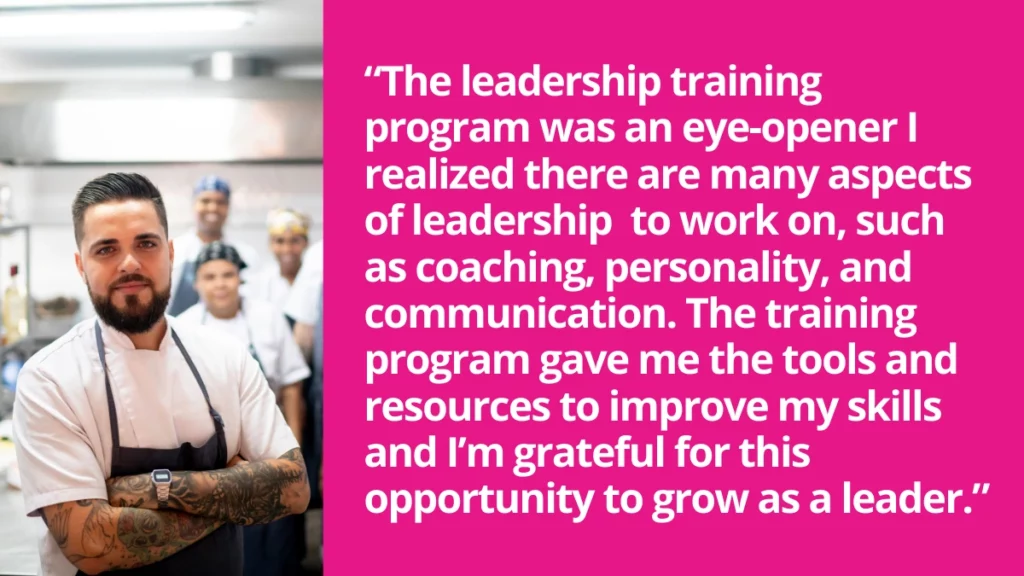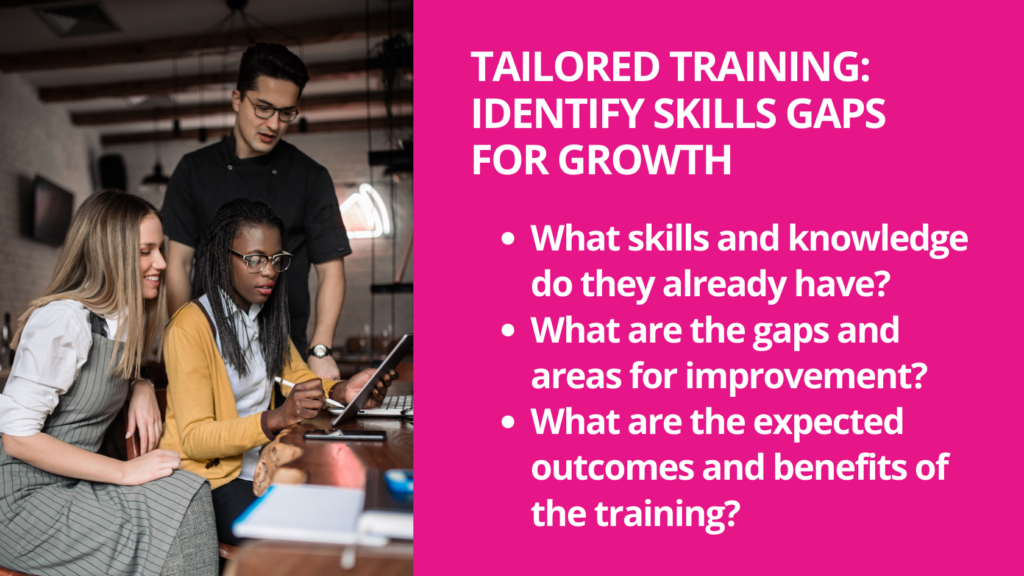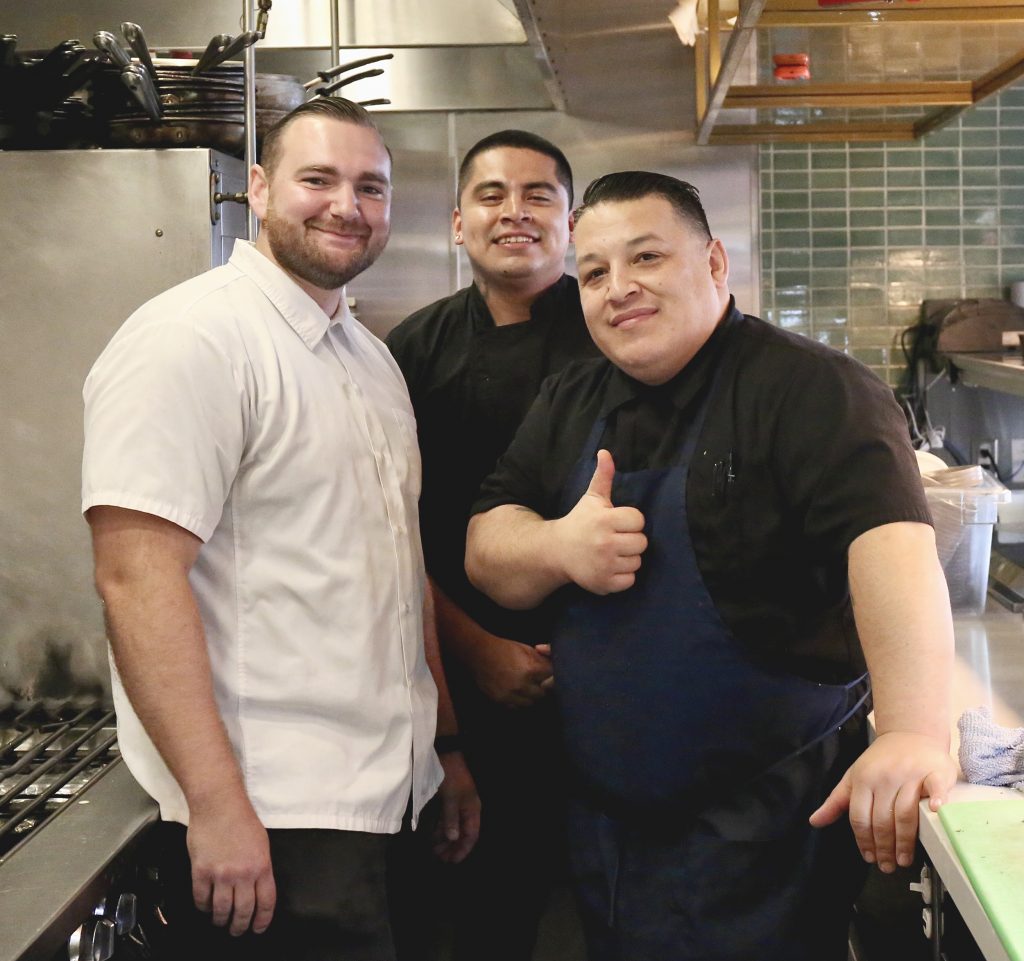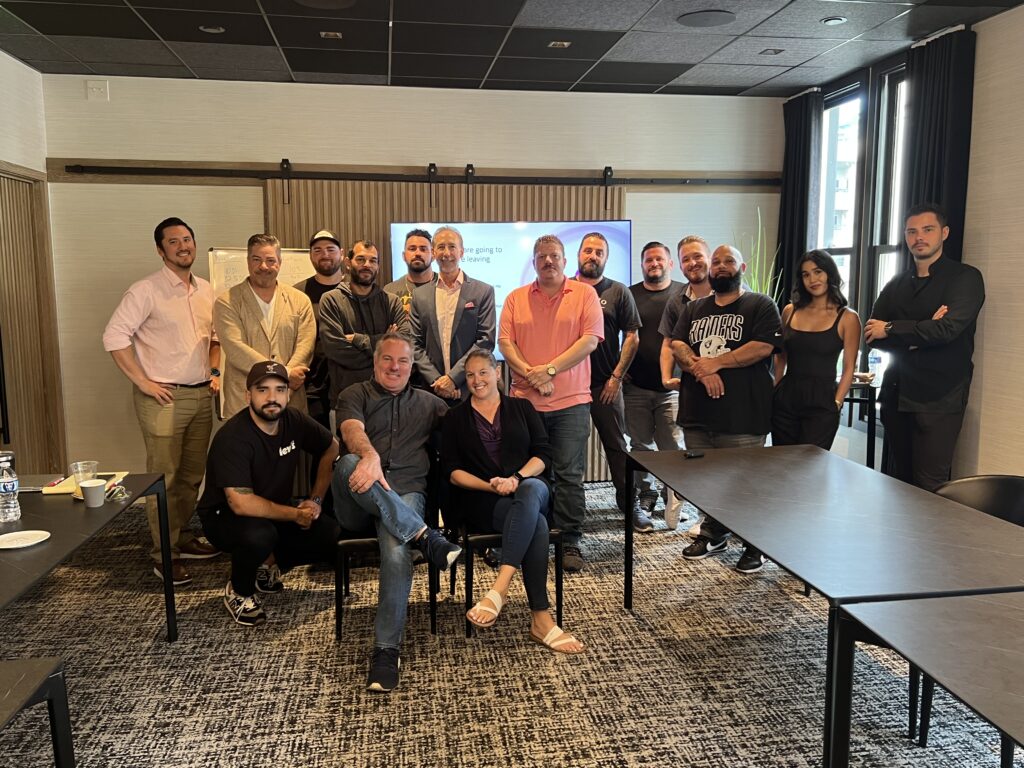Future-Proof Your Hospitality Business with Continued Education
Continued education is essential for any business that wants to stay ahead of the curve, but it’s especially important in the Hospitality Industry, where the job market is challenging and customer expectations are constantly evolving.
Investing in ongoing education isn’t just a strategic choice; it’s a necessity for improving employee satisfaction, curbing turnover, and delivering outstanding customer service. In this article, we’ll explore how RMD Group champions continued education for its team and how you can do the same.
How RMD Group Implements Continued Education for Its Team
Many businesses, especially those on a tight budget, overlook continued education as a necessary expense. However, at RMD Group, we believe that continued education is one of the most important things we can do for our team, especially in this challenging job market.
We want our managers and staff to have the skills and knowledge they need to grow within their roles, contribute to the organization, and provide an outstanding customer experience.
There are other benefits too. For example:
-
- Employees who participate in continued education programs are more likely to have increased job satisfaction.
-
- And, employers who invest in continued education for their employees benefit from increased productivity, reduced turnover, and improved customer service.
That’s why we’ve invested in various training and coaching programs that cover a wide range of topics and skills relevant to the hospitality industry.
Leadership Training Program

One of the training programs we’ve implemented is the leadership training program. We work with an outside expert group that specializes in hospitality to help us conduct this eight-week training program.
The training is a three-stage process that involves skills training on a range of topics including emotional intelligence, effective communication, behavioral interviewing, and effective employee candidate assessment.
The skills our managers and potential managers acquire during the training help them:
-
- develop their leadership styles and techniques
-
- improve their communication and emotional intelligence
-
- understand their own and others’ personalities
-
- give and receive feedback effectively
-
- coach their staff for success and correction
-
- lead their teams with trust and accountability
-
- and better assess candidates for hiring
This helps our business run more effectively, while giving our employees the skills they need to succeed in their roles.
Pre-Shift and Scheduled Training Sessions
Another way we implement continued education for our team is through pre-shift and scheduled training sessions. We do these on a regular basis to help our staff improve their product knowledge, service and communication skills and more.
We cover topics such as food and wine knowledge, sake training, guest experience, host training, server training, the latest menu items, specials, and seasonal offerings, as well as to teach them how to wow our guests during their dinner experience, by going above and beyond.
These sessions are also a good opportunity to reinforce health and safety practices, such as food handling and hygiene, proper use of kitchen equipment, fire safety and evacuation procedures, and so on.

Future Training Topics and Sessions
Of course, we’re always looking for ways to improve and grow. At RMD Group, we stay ahead of the curve by planning future training sessions for our managers and staff.
These training sessions cover a variety of topics, such as:
-
- Financial Management: Budgeting and cost control, profit and loss analysis, inventory management, etc.
-
- Marketing and Promotion: Social media marketing strategies, local advertising and promotions, customer loyalty programs, etc.
-
- Crisis Management: Handling emergencies and crises, contingency planning, staff safety procedures, etc.
-
- Technology Integration: POS system proficiency, online ordering and delivery platforms, data analytics for decision-making, etc.
In addition to these topics, we may also offer training on:
-
- Customer service: This is essential for any business, but especially important in the hospitality industry, where customer satisfaction is key.
-
- Leadership and management: If you have managers on your team, it’s important to provide them with the training and development they need to be effective leaders.
-
- Diversity and inclusion: The hospitality industry is a global industry, and it’s important to create a workplace where everyone feels welcome and included.
How to Get Started with Continued Education in Your Hospitality Business

The first step to implementing continued education is to figure out what your team needs and wants to learn. What skills and knowledge do they already have? What are the gaps and areas for improvement? What are the expected outcomes and benefits of the training?
To answer these questions, talk to your team members, managers, and customers. You can do this through surveys, interviews, focus groups, performance reviews, or customer reviewsfor example.
Here are some questions to consider:
-
- What core skills and knowledge does your team need to do their jobs well?
-
- What new skills and knowledge do they need to adapt to the changing market and customer demands?
-
- What specific challenges and problems do they face in their daily work?
-
- How can training help them overcome these challenges and problems?
-
- How can training help your business achieve its goals?
-
- How can training help your team members advance their careers and personal development?
Once you have a good understanding of your team’s needs and goals, you can start to research and implement different training programs.
Choose the Right Training Methods and Providers
Once you know what your team needs to learn, it’s time to choose the right training methods and providers. There are many different options available, so it’s important to consider your budget, time constraints, and the learning styles of your team members.
Some popular training methods include:
-
- Online courses: Online courses are a convenient and flexible way for employees to learn at their own pace.
-
- Workshops: Workshops provide hands-on training and opportunities for employees to learn from each other.
-
- Webinars: Webinars are a cost-effective way to deliver training to a large number of employees at once.
-
- Mentorships: Mentorships pair employees with experienced professionals who can provide guidance and support.
When choosing training providers, be sure to consider their reputation, expertise, and track record. You should also make sure that the training is aligned with the needs and goals of your business and employees.
Here are some tips for choosing the right training methods and providers:
-
- Consider your budget. Some training methods, such as workshops and mentorships, can be more expensive than others. Consider partnering with a sister company or similar group who could join in and split the costs. In a recent training, we partnered with the Verant Group which not only made the training more affordable, but created a more diverse group!
-
- Think about your time constraints. Some training programs, such as online courses, can be completed at the employee’s own pace, while others, such as workshops, require a specific time commitment.
-
- Consider the learning styles of your team members. Some people prefer to learn by doing (hands-on training), while others prefer to learn by listening or reading.
Don’t be afraid to ask around for references so that you are confident you’re choosing a training provider with a good reputation and expertise in the area you want your team to learn about.
Allocate a reasonable budget and time

Next, it’s time to figure out how much money and time you’re going to invest in the mission.
You’ll need to compare costs, so be prepared to get quotes from different training providers to find the best value for your money. You can also do some research to find discounts or learn about potential subsidies, grants, or sponsorships available to help offset the cost of training.
In any case, be sure to plan ahead.
Communicate your training plans to your team members well in advance so they can make arrangements and schedule the training during off-peak hours to minimize disruption to your business.
It’s also great to give staff members the autonomy to choose relevant training and learn at their own pace. This will make them more likely to be engaged and motivated. The key is to be flexible and practical.
Evaluate the effectiveness and impact
It’s important to figure out how well your training worked, what went well, and what can be improved for future training.
This means measuring the results and outcomes of the training, and assessing how they align with your business goals and the needs of your team members.
Some methods to evaluate your training sessions include:
-
- Conduct pre- and post-training assessments: This could involve quizzes, surveys, or interviews that will help you measure the changes in your team members’ skills, knowledge, and performance.
-
- Track key performance indicators (KPIs): This could include metrics such as customer satisfaction, employee retention, productivity, and profitability. See how these metrics change after the training.
-
- Collect feedback: This could include team members, managers, and customers. Ask them for their feedback on the strengths and weaknesses of the training.
-
- Conduct follow-up sessions or coaching: This will help to reinforce the learning outcomes and address any issues or gaps.
To get a more complete picture, try to use multiple evaluation methods and be consistent with them. This will help you to track progress over time, compare your evaluation results to your training goals, improve your future training programs, and provide your team members with the best possible training experience.
Encourage a culture of learning and growth
Imagine your hospitality team as a team of superheroes. Each person has their own unique skills and abilities, but they all come together to create a powerful force for good. A culture of continuous learning and growth is like a superpower itself. It allows your team to stay ahead of the curve, adapt to new challenges, and deliver exceptional experiences to your guests.
So how do you create this kind of culture?
Start by engaging your team in the planning process. Ask them what they want to learn and how they want to learn it. This shows that you value their input and that you’re committed to their development.
-
- Encourage collaboration. Create opportunities for your team members to work together, share ideas, and learn from each other. This helps to build a sense of community and mutual support.
-
- Provide regular feedback. Let your team members know how they’re doing and where they can improve. This helps them to stay motivated and on track with their learning goals.
-
- Recognize and celebrate learning. When your team members achieve a learning goal, be sure to acknowledge their hard work and dedication. This shows them that their efforts are appreciated and that you’re invested in their success.
-
- Create a culture of curiosity and exploration. Encourage your team members to ask questions, experiment with new ideas, and challenge the status quo. This helps them to develop their critical thinking skills and become more innovative.
Remember, though, this isn’t just about ticking boxes! It’s about creating a culture that thrives on curiosity, camaraderie, and creativity.
So, whether it’s mastering the communication or unraveling flavor dynamics, strive to make learning fun and engaging. Before you know it, you’ll have a culture where everyone is excited to grow and develop their skills. This will benefit your team members, your business, and ultimately, your guests.
Learn More About Continued Education for Your Hospitality Business
Continued education is a key to success in the hospitality industry. It helps your team learn new skills and knowledge, which leads to better customer service, higher employee retention, and increased profits.
Of course, implementing continued education can be challenging, especially for small and medium-sized businesses with limited resources and time. But if you’re looking for a way to invest in your team and take your business to the next level, we encourage you to give it a try!
If you are looking to implement more continued education or training for your management team or employees, let us know!


